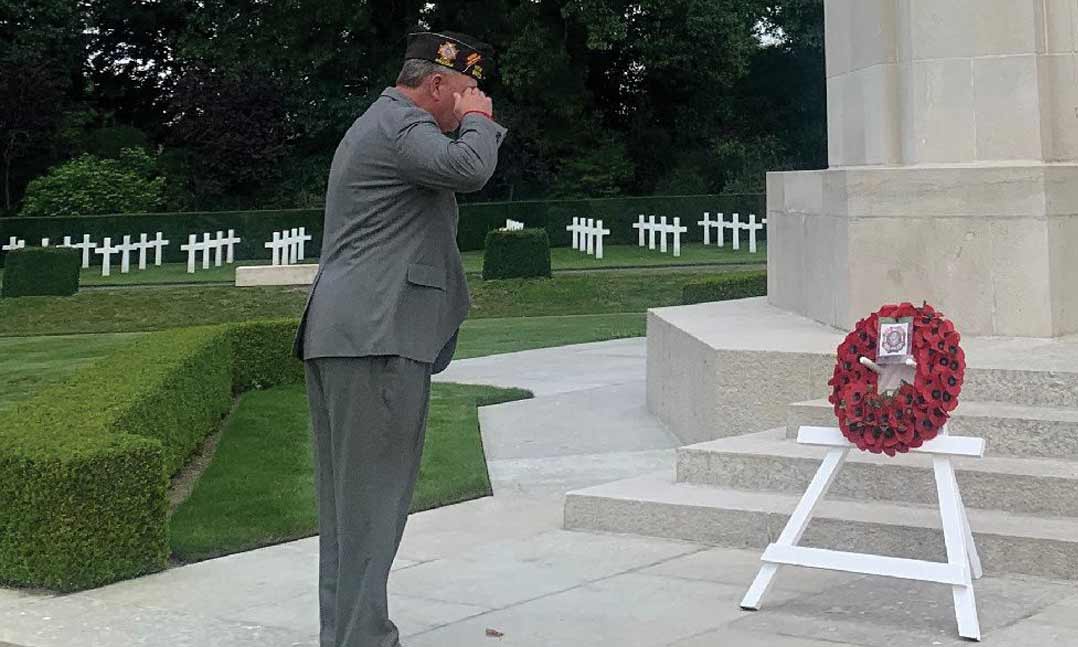During one of his first overseas trips as VFW Commander-in-Chief, Tim Borland made it a priority to visit a site that ties directly to one of VFW’s most cherished symbols. The Flanders Field American Cemetery and Memorial in Waregem, Belgium, contains 368 burial sites, the majority of which are the final resting place for U.S. troops who died fighting in the last weeks of World War I.
“I had to see the cemetery,” Borland said. “It is sacred ground for the VFW. The history of the heroes laid to rest here, and the lore of our own "Buddy"® Poppy just surrounds you. It is one of the best trips I’ve taken yet as VFW Commander-in-Chief.”
 VFW Commander-in-Chief Tim Borland salutes after laying a wreath on Sept. 2, 2022, at the Flanders Field American Cemetery and Memorial in Waregem, Belgium. The cemetery is the setting for the poem “In Flanders Field,” which was the inspiration for VFW’s Buddy Poppy, the organization’s official flower.Flanders Field is the setting for the poem “In Flanders Fields,” written in 1915 by Col. John McCrae, a WWI Canadian soldier who died of illness in a British officers hospital in 1918. The literary work presented a striking image of bright red poppies blooming among the rows of white crosses marking the graves in and around Flanders, the northern portion of Belgium that saw heavy fighting in World War I.
VFW Commander-in-Chief Tim Borland salutes after laying a wreath on Sept. 2, 2022, at the Flanders Field American Cemetery and Memorial in Waregem, Belgium. The cemetery is the setting for the poem “In Flanders Field,” which was the inspiration for VFW’s Buddy Poppy, the organization’s official flower.Flanders Field is the setting for the poem “In Flanders Fields,” written in 1915 by Col. John McCrae, a WWI Canadian soldier who died of illness in a British officers hospital in 1918. The literary work presented a striking image of bright red poppies blooming among the rows of white crosses marking the graves in and around Flanders, the northern portion of Belgium that saw heavy fighting in World War I.
The poem inspired VFW delegates to approve a motion at the 1922 National Convention in Seattle, Washington, declaring the poppy as VFW’s official flower. In May 1924, VFW registered the name
“Buddy" Poppy with the U.S. patent office, which gave the VFW all rights to the name.
‘THANKFUL FOR THEIR FIGHTING SPIRIT’
While Borland was at the cemetery, he met a Belgian father and son who were visiting the grave of U.S. Army Pvt. Raleigh D. Cawein, a 19-year-old New Yorker who was serving with the 105th Inf., 27th Division when he was killed on Sept. 2, 1918.
The Belgian father, Thierry Faveere, and his son, Onno, were at Cawein’s grave laying flowers to commemorate the day the soldier had died. It has been part of the Faveere family’s regular duties since they adopted the grave in 2014.
“We want our young son to learn about the history of our region,” said the elder Faveere, whose family home is less than a half-mile from the cemetery. “Raleigh Cawein’s grave was assigned to us because little was known about him, even his date of birth. We also should not forget to mention that the opportunity was made possible in honor of the 100th anniversary of the war.”
Borland said he was intrigued to see a local family honoring a U.S. war hero. The Chief gave Onno a VFW Commander-in-Chief challenge coin and, emphasizing his motto that “Every Veteran Counts,” explained the mission of the VFW.
“What a smile when his dad told him who we were,” recalled Borland, who noted that while Thierry speaks English, Onno does not. “War heroes are all this kid appreciates.”
Thierry said that Onno spoke to his class at school about his visit with the VFW Commander-in-Chief and showed off his challenge coin. The father added that it is important for those of Onno’s age to understand the sacrifices made on their behalf.
“It is thanks to many brave soldiers that we can now live in a free country,” Thierry said. “We should be thankful for their fighting spirit for peace. It is thanks to them that we can now experience this peace.”
Borland says he is thankful to have been able to visit such a place with so much world, American and VFW history.
“It really is a beautiful site,” Borland said. “There are hedges and flowers everywhere, with the poppies blooming in April. It is very well-maintained with an impressive shrine at the center. It reminded me of a little Arlington. The honor of being there gave me goosebumps. It was humbling.”
This article is featured in the 2023 May issue of VFW magazine, and was written by Tim Dyhouse, editor-in-chief of VFW magazine.